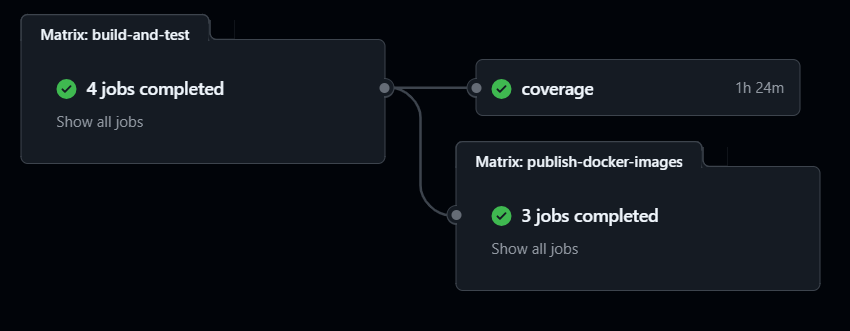Social-Network
CI / CD
The Continuous Integration (CI) and Continuous Deployment (CD) processes are essential parts of a DevOps software development lifecycle.
During the CI process, the code is automatically built, tested, and analyzed every time a developer
pushes code to the repository. In our case there are two branches that can trigger the process: main and dev.
This process helps to catch bugs early in the development cycle and ensures that the codebase
is always in a deployable state.
The project uses GitHub Actions to realize a CI/CD process. GitHub Actions is a powerful tool that allows automating the software development workflow directly in the GitHub repository.
CI / CD Action
The file .github/workflows/ci-cd.yml contains the configuration for the entire CI/CD process.
This action performs build, test and delivery tasks.
Build And Test
build-and-test:
strategy:
matrix:
os:
- ubuntu-24.04
# - macos-14
# - windows-2022
java-version: [17, 21]
java-distribution: [corretto, temurin]
runs-on: $
concurrency:
group: build-$-$-$-$-$
cancel-in-progress: true
steps:
- name: Checkout
uses: actions/checkout@v4.2.2
- name: Build using Gradle
uses: DanySK/build-check-deploy-gradle-action@3.5.25
with:
pre-build-command: |
echo -n "$" > db-password.txt
echo -n "$" > db-root-password.txt
java-version: $
java-distribution: $
should-run-codecov: false
retries-on-failure: 3
The job builds the entire project and subsequently runs all tests.
The job’s configuration is determined by the Cartesian product of:
- os
- java-version
- java-distribution
This ensures correct functionality is verified for every configuration. Due to the tests that utilize Docker, the job cannot be executed on Windows or macOS, as these platforms currently do not fully support this technology.
The cancel-in-progress flag, set to true, ensures that processes are terminated if a more recent commit is detected.
The steps include:
- Checkout: Clones the repository onto the virtual machine (runner) where the job is executed, enabling subsequent steps.
- Build using Gradle: Utilizes an external action to build and test the project. Notably,
the
pre-build-commandwrites two GitHub secrets to a file, making them accessible during the tests.
Publish Docker Images
publish-docker-images:
needs: build-and-test
runs-on: ubuntu-latest
strategy:
matrix:
service:
- "friendship-service"
- "content-service"
- "user-service"
steps:
- name: Checkout
uses: actions/checkout@v4
- name: Build service $
uses: DanySK/build-check-deploy-gradle-action@3.7.0
with:
should-run-codecov: false
build-command: |
if [ "$" == "content-service" ]; then./gradlew :$:compileTypescript
else./gradlew :$:assemble
fi
check-command: ":"
- name: Login to Docker Hub
uses: docker/login-action@v3
with:
username: $
password: $
- name: Build and push $ image
uses: docker/build-push-action@v6
with:
context: ./$
push: true
tags: |
marcofontana17/social-network-$:latest
marcofontana17/social-network-$:$
This job is responsible for the automatic publishing of microservice images to DockerHub.
The necessary steps are:
- Checkout: Clones the repository to the virtual machine (runner) for further execution.
- Build Service: Builds the various microservices. Note that the build-command is conditional,
meaning it executes different Gradle tasks depending on the subproject being processed,
assembletask for JVM ones andcompileTypescriptfor NodeJS. - Login To Docker Hub: Logs into the platform using a username and password stored as secrets.
- Build and Push: Actually publishes the built images.
It is important to note that this job depends on the previous one, so it is not necessary to re-run the tests
(the assemble task) during the build.
Coverage
coverage:
needs: build-and-test
runs-on: ubuntu-latest
steps:
- name: Checkout
uses: actions/checkout@v4.2.2
- name: Generate coverage report
uses: DanySK/build-check-deploy-gradle-action@3.5.25
with:
pre-build-command: |
echo -n "$" > db-password.txt
echo -n "$" > db-root-password.txt
should-run-codecov: false
check-command: "./gradlew koverXmlReportAggregated --parallel"
retries-on-failure: 3
- name: Push coverage report
uses: codecov/codecov-action@v5.2.0
with:
files: ./build/reports/kover/reportAggregated.xml
verbose: true
slug: GiacomoRomagnoli/Social-Network
env:
CODECOV_TOKEN: $
The final job also depends on Build and Test and is responsible for generating coverage reports and publishing them on CodeCov to verify the coverage of the tests.
The necessary steps are:
- Checkout: Clones the repository to the virtual machine (runner).
- Generate Coverage Report: Produces the reports using
Kover, throughkoverXmlReportAggregatedtask that aggregates all coverage reports generated in a single file. - Push Coverage Report: Publishes the generated reports to CodeCov using a token stored as a secret.
GitHub Pages
To keep the project updated over time, the GitHub Pages mechanism was utilized to distribute all documentation produced during development. This GitHub feature allows developers to host a web server that serves their documentation, automatically updating the hosted documents with each push that modifies them.
| « Back to Index | « Previous | Next » |
